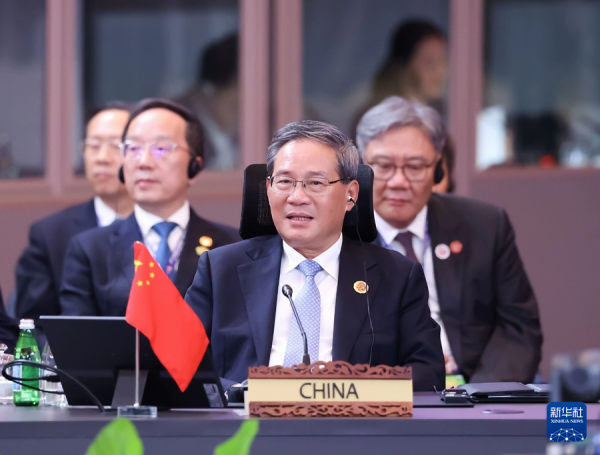
People’s Republic of China


On October 27, 2025 local time, Premier Li Qiang of the State Council attended the 20th East Asia Summit (EAS) in Kuala Lumpur, Malaysia.
Li Qiang said that twenty years ago, the EAS was inaugurated in Kuala Lumpur. Over the past two decades, the EAS has played a constructive role on the whole in promoting the steady and rapid development of the region. At present, the world is in a new period of turbulence and transformation, with new risks and challenges facing peace and development. President Xi Jinping has formally put forward the Global Governance Initiative (GGI) to address changes in the world and tackle pressing problems, highlighting the imperative of adhering to sovereign equality, abiding by international rule of law, practicing multilateralism, advocating the people-centered approach and focusing on taking real actions. This is very relevant in today's world, and is fully consistent with the EAS founding mission.
Li Qiang pointed out that China will work with all parties to ensure that this mission is observed, and take vigorous actions to promote the GGI to boost peace and development of the region. First, continuously build extensive consensus. Mutual respect, equality, fairness and justice underpin state-to-state interactions. The trend toward economic globalization and multipolarity is irreversible, and the world must not slip back to the law of the jungle where the strong prey on the weak. Only when we embrace these basic understandings that are consistent with the common values of humanity and the trend of history, can we make the right decision at this critical juncture and move ahead in the right direction. Second, focus on solving prominent issues. Growing the economy and improving people's lives is a priority for countries in the region. All parties should more firmly uphold the free trade regime, create a high-standard regional free trade network, and vigorously and effectively advance regional integration. All parties should also do more together to improve people's well-being and achieve inclusive development for all. Third, reform and improve the system of norms. The more volatile the world becomes, the more imperative it is to uphold the authority of international law. All parties should observe rules. In particular, all should jointly safeguard the U.N.-centered international system, support ASEAN centrality in the regional architecture, and promote cooperation in the region. At the same time, all parties should also actively promote reform and build a more just and equitable global governance system, so as to better safeguard the interests of all.
The participating leaders said that the current international situation is undergoing profound and complex changes, with geopolitical conflicts intensifying and protectionism on the rise. Regional countries should return to the original aspirations of the EAS, uphold multilateralism and the basic principles of international law, including the U.N. Charter, and work together to advance peace-building. The leaders called for dialogue in the spirit of mutual respect, innovation in partnerships, and stronger practical cooperation to jointly address challenges such as energy and food security, green transition, climate change, and public health, and to promote lasting peace, stability and prosperity in the region and the world.
The meeting was chaired by Prime Minister Dato' Seri Anwar Ibrahim of Malaysia, the rotating chair of ASEAN. The Kuala Lumpur Declaration on the Twentieth Anniversary of the East Asia Summit and the East Asia Summit Leaders' Statement on Promoting Localization in Anticipatory Action for Disaster Preparedness and Response were adopted at the meeting.



